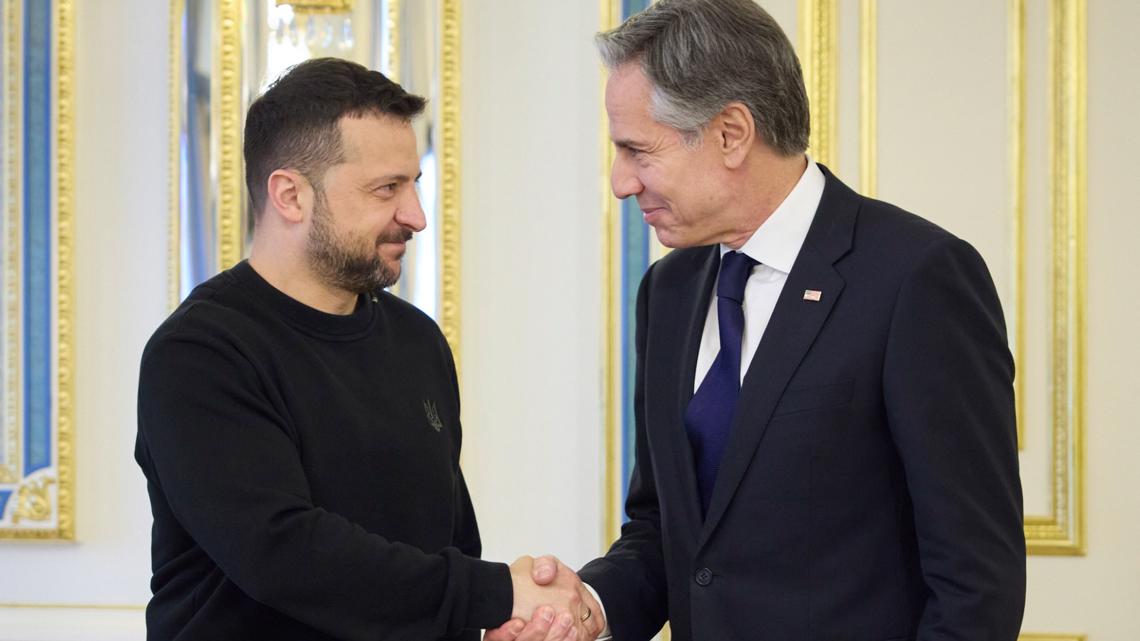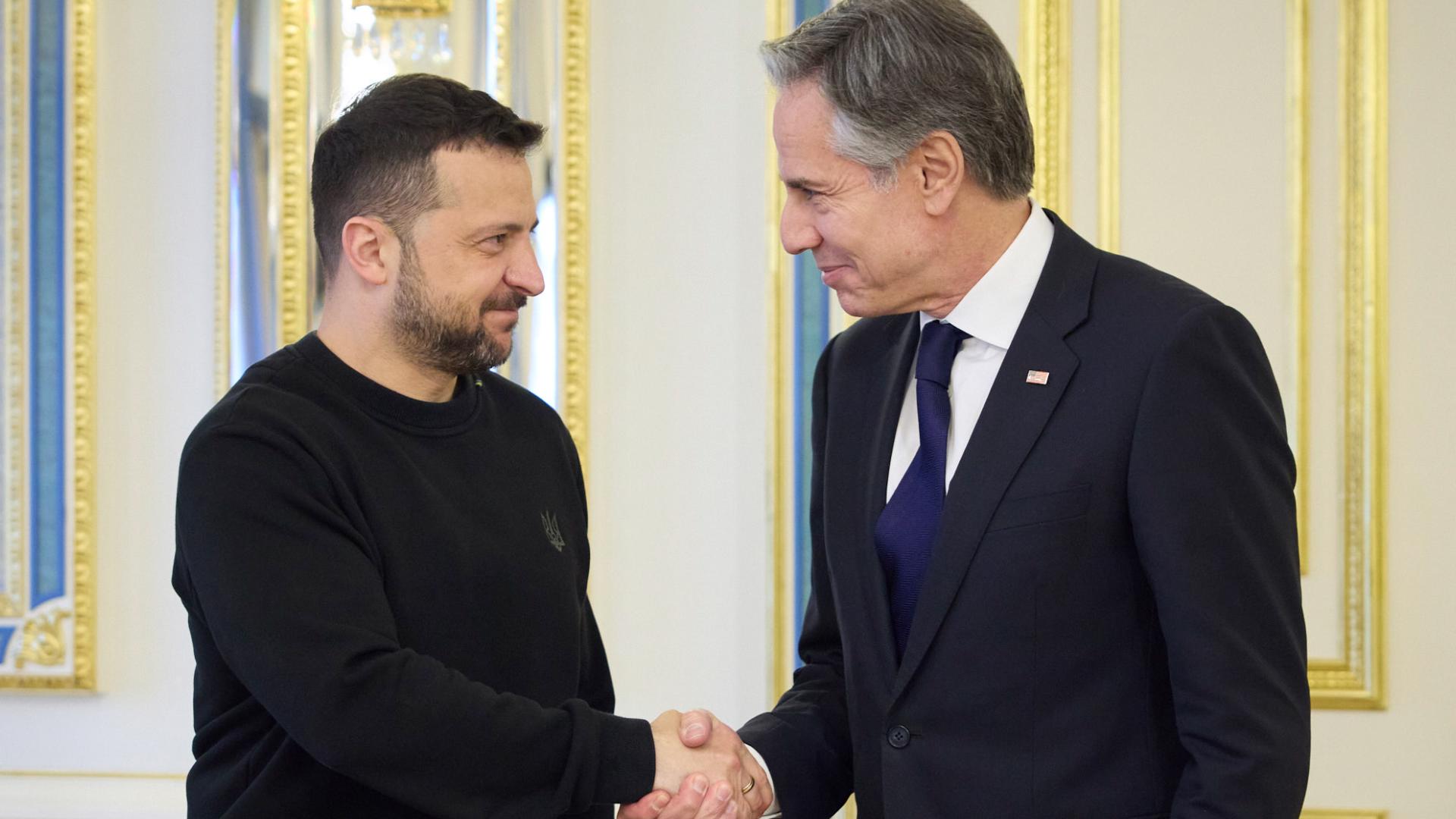KYIV, Ukraine — U.S. Secretary of State Antony Blinken sought Tuesday to rally the spirits of glum Ukrainians facing a fierce new Russian offensive, assuring them that they are not alone and that billions of dollars in American military aid on its way to the country would make a “real difference” on the battlefield.
After a day of meetings with senior officials, civil society figures and university students during which he exhorted them against being discouraged, Blinken took to the stage at a Kyiv bar to play rhythm guitar with a local band on Neil Young's 1989 hit “Rockin' in the Free World."
Earlier on his unannounced visit to Kyiv, Blinken told Ukrainian leaders that despite a monthslong delay in U.S. assistance that left them vulnerable to renewed Russian military strikes more weaponry is coming and some has already arrived.
He made the case even as Ukrainian President Volodymyr Zelenskyy appealed to him personally for more air defense systems to protect civilians under intense Russian fire in the northeast. Blinken also lambasted Russian President Vladimir Putin for underestimating Ukraine's determination to fight back.
“We meet at a critical moment,” he told students at the Kyiv Polytechnic Institute. “The coming weeks and months will demand a great deal of Ukrainians, who have already sacrificed so much. I’ve come to Ukraine with a message: You are not alone.”
“We sometimes hear that time is on Putin’s side,” Blinken said. “That Russia’s bigger population, Putin’s willingness to throw more Russians into the meat grinder of his making, and sink more of Russia’s resources into trying to subjugate Ukraine means that Russia can’t lose.”
“In fact, Russia’s been losing the battle to control Ukraine’s destiny for 20 years. And Putin has it wrong – time is on Ukraine’s side,” he said. “As the war goes on, Russia is going back in time. Ukraine is moving forward.”
And yet, in increasingly intense attacks along the northeastern border in recent days, Moscow’s troops have captured around 100 to 125 square kilometers (40 to 50 square miles) in the northeast Kharkiv region that includes at least seven villages, according to open-source monitoring analysts. Though most of those villages were already depopulated, thousands of civilians in the area have fled the fighting.
The Kremlin’s forces have also been making a concerted push in the east, seeking to drive deeper into the partly occupied Donetsk region. The main focus of Russian attacks Tuesday was Pokrovsk, just inside the Ukrainian border in Donetsk, where the Kremlin’s forces launched 24 assaults, the Ukrainian general staff said in a report.
Analysts have called this moment one of the most dangerous for Ukraine since Russia's full-scale invasion in February 2022.
“We know this is a challenging time,” Blinken told Zelenskyy in his first meeting of the day after arriving in Kyiv on an overnight train from Poland. But, he added that American military aid is “going to make a real difference against the ongoing Russian aggression on the battlefield.”


The visit comes less than a month after Congress approved a long-delayed foreign assistance package that sets aside $60 billion in aid for Ukraine, much of which will go toward replenishing badly depleted artillery and air defense systems.
Moscow’s renewed offensive in Kharkiv is the most significant border incursion since the early days of the war — and comes after months when the roughly 1,000-kilometer (620-mile) front line barely budged.
More than 7,500 civilians have been evacuated from the area, according to authorities. At the same time, the Kremlin’s forces are expanding their push to the northern border regions of Sumy and Chernihiv, Ukrainian officials say, and Kyiv's outgunned and outnumbered soldiers are struggling to hold them back.
Troops fought street to street on the outskirts of Vovchansk, among the largest towns in the Kharkiv area, regional Gov. Oleh Syniehubov said on national television. Two civilians were killed in Russian shelling Tuesday, he said.
The U.N. human rights office said the battles are taking a heavy toll.
“We are deeply concerned at the plight of civilians in Ukraine,” Liz Throssell, spokeswoman for the office of the U.N. High Commissioner for Human Rights, said in Geneva. “In the Kharkiv region, the situation is dire.”
Russia in recent weeks also has launched wide attacks on Ukraine's energy infrastructure. The operator of the national high-voltage electricity grid, Ukrenergo, said late Tuesday that it was starting “controlled emergency shutdowns” for industries and households because of “a significant shortage of electricity in the system due to Russian shelling and an increase in consumption due to the cold weather.”
Zelenskyy thanked Blinken for the U.S. aid — but added that more is necessary, including two Patriot air defense systems urgently needed to protect Kharkiv.
“The people are under attack: civilians, warriors, everybody. They’re under Russian missiles,” he said.
Artillery, air defense interceptors and long-range ballistic missiles have already been delivered, some of them already to the front lines, said a senior U.S. official traveling with the secretary who spoke to reporters on condition of anonymity ahead of Blinken’s meetings.
Ahead of the trip, U.S. officials noted that since President Joe Biden signed the aid package late last month, the administration has already announced $1.4 billion in short-term military assistance and $6 billion in longer-term support.
Blinken, on his fourth trip to Kyiv since Russian troops rolled over the border, told Ukrainian Prime Minister Denys Shmyhal that the U.S. intends to support Kyiv beyond the war's end.
“The United States is determined, determined to help Ukraine succeed, succeed both in the battlefield victory but also succeed, as we would say, in winning the peace and building the strongest possible Ukraine,” Blinken said.
But delays in U.S. assistance, particularly since the Israel-Hamas war began and has preoccupied top administration officials, have triggered deep concerns in Kyiv and Europe. Blinken, for example, has visited the Middle East seven times since the war in Gaza began in October. His last trip to Kyiv was in September.
Blinken went with Ukrainian Foreign Minister Dmytro Kuleba for lunch at a Kyiv pizza restaurant founded by Ukrainian veterans, pronouncing it “superb.” On Blinken’s last visit, the pair ate at a recently reopened McDonald’s restaurant.
Blinken's speech to students extolling Ukraine's “strategic successes” in the war was billed as a complement to one he gave last year in Helsinki, Finland, deriding Putin for Moscow’s “strategic failures” in launching the war.
Since the Helsinki speech, however, Russia has intensified its attacks, most noticeably as the U.S. House of Representatives sat on the aid package for months without action, forcing a suspension in the provision of most U.S. assistance. Those attacks have increased in recent weeks as Russia has sought to take advantage of Ukrainian shortages in manpower and weapons while the new assistance is in transit.
Meanwhile, Putin plans to make a two-day state visit to China this week, the Chinese Foreign Ministry said. Beijing has backed Moscow politically in the war and has sent machine tools, electronics and other items seen as contributing to the Russian war effort, without actually exporting weaponry.
Blinken and other U.S. officials said despite some recent setbacks, Ukraine could still claim significant victories. Those include reclaiming some 50% of the territory Russian forces took in the early months of the war, boosting its economic standing and improving transportation and trade links, not least through military successes in the Black Sea.
___
Associated Press writers Illia Novikov in Kyiv, Ukraine, and Jamey Keaten in Geneva contributed to this report.

